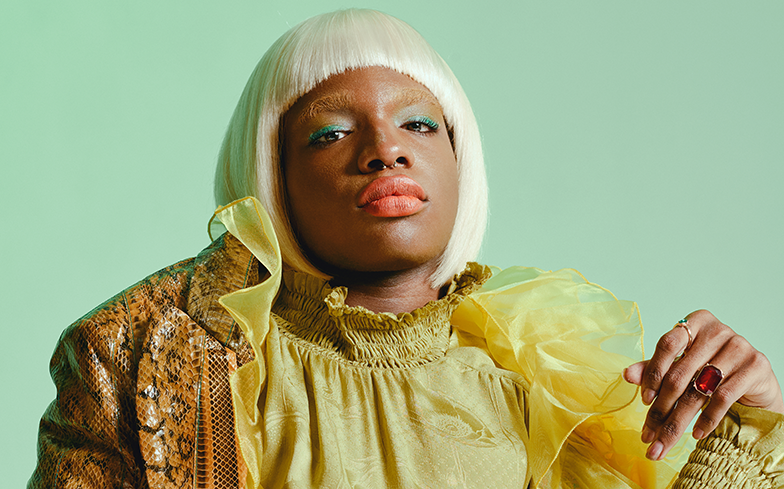
“I want people to look at me and feel like they have someone who is advocating for them.”
Aaron Philip doesn’t want to be known as the disabled, black, trans model. She’s a model, period. “Being trans and disabled… I don’t want to claim it because I have to claim it. I claim it because it is me, objectively,” she says. “Why should that make me an entirely different entity of model, when I’m just Aaron Philip?”
Earlier this year, the 18-year-old made her runway debut at Willie Norris’ fashion show with the words ‘Queer Capital’ on the back of her wheelchair; since then, she’s landed her own campaign with Sephora and has a genuine fan in – and we’re going to capitalise this – NAOMI CAMPBELL. She’s also become a beacon of light for those in minority communities who want to follow in her footsteps and ‘feel their fish’.
“I love the fact that people who are just like me can relate to me and feel represented,” she continues. “That’s what I want, I want people to look at me and feel like they have someone who is advocating for them.” We asked Aaron’s close friend, actress and singer-songwriter Amandla Stenberg to interview the star about representing the black, trans and disabled communities, and how the fashion industry is slowly catching up with diverse representation.
Amandla Stenberg:
Hi Aaron! It’s time for our kiki, finally.
Aaron Philip:
Finally!
Amandla Stenberg:
You’re in the midst of wrapping up Fashion Week, how has that been?
Aaron Philip:
I love Fashion Week. I think it’s so interesting because when you work as a model, sometimes you don’t get the opportunity to see how the industry is from the inside out. Fashion Week shows that in a really weird way; everyone and everything is so high-paced, there’s parties everywhere, there’s gigs everywhere. As an observer, you’re like, ‘Wow, people are just zooming around like hummingbirds out here.’ My agents are up and down everywhere. I think Fashion Week is the most chaotic time of the year in fashion – it’s like Christmas!
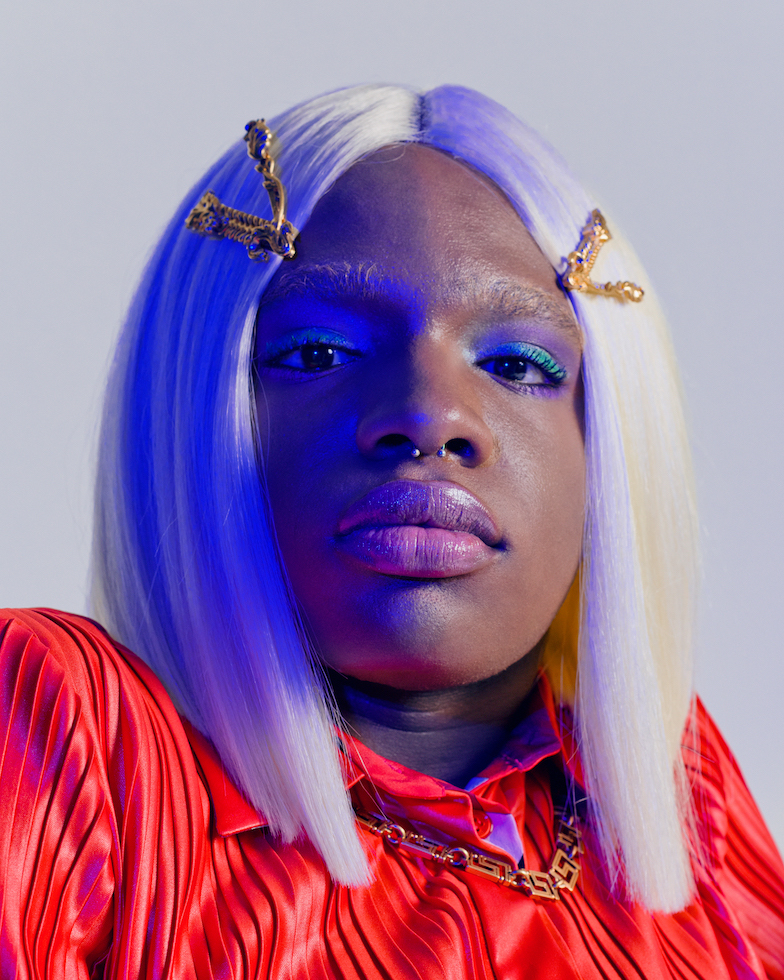
Amandla Stenberg:
[Laughs] Right? Have you seen any shows you love?
Aaron Philip:
I got invited to see Tommy [Hilfiger]. We’ve talked about this, but sometimes when I go to shows, I don’t come out of them feeling the way I do when I see Tommy. Tommy is such a wonderful celebration of blackness and it’s so authentic and true. It had such a good energy to it. You can feel it when you’re there watching it and I think the concept of the show is really beautiful because it celebrates a part of history that’s not normally celebrated.
Amandla Stenberg:
As a New Yorker – how did it feel to have that part of New York’s history told through the medium of fashion?
Aaron Philip:
I feel like for a long time, fashion only focused on whiteness. Having something that feels so close to home at a fashion show is major for anyone who’s part of New York City, and I think we all understand that they got Harlem down to the route. They had afros and the styling was on point! It was very much it, and I was very happy to be there.
Amandla Stenberg:
That’s beautiful.
Aaron Philip:
Beautiful for real.
Amandla Stenberg:
I’m objectively observing Fashion Week from Paris, but I feel like something that I’ve noticed globally throughout the entire week is the celebration of blackness, and how they’re prioritising and celebrating blackness and black aesthetics and black culture.
Aaron Philip:
I just think, ‘Thank God.’ At least they’re not culturally appropriating or being racist – there’s black people at the forefront celebrating blackness. There’s been instances of blackface and hair problems and all those things, at least the black people are doing it now.
Amandla Stenberg:
Yeah, absolutely. As a black, trans and disabled model, do you feel like you’ve witnessed a shift in the industry since you first started? Which I guess was like, what, three years ago now?
Aaron Philip:
Three years! I think I came in right when things were getting down to the nitty gritty of truly embracing body diversity and people accepting blackness as a true access to fashion. You can go anywhere now and see black models in the highest campaigns – as it should be! Five years ago or so, there were no black models on these runways or campaigns. It went from nothing to everything.
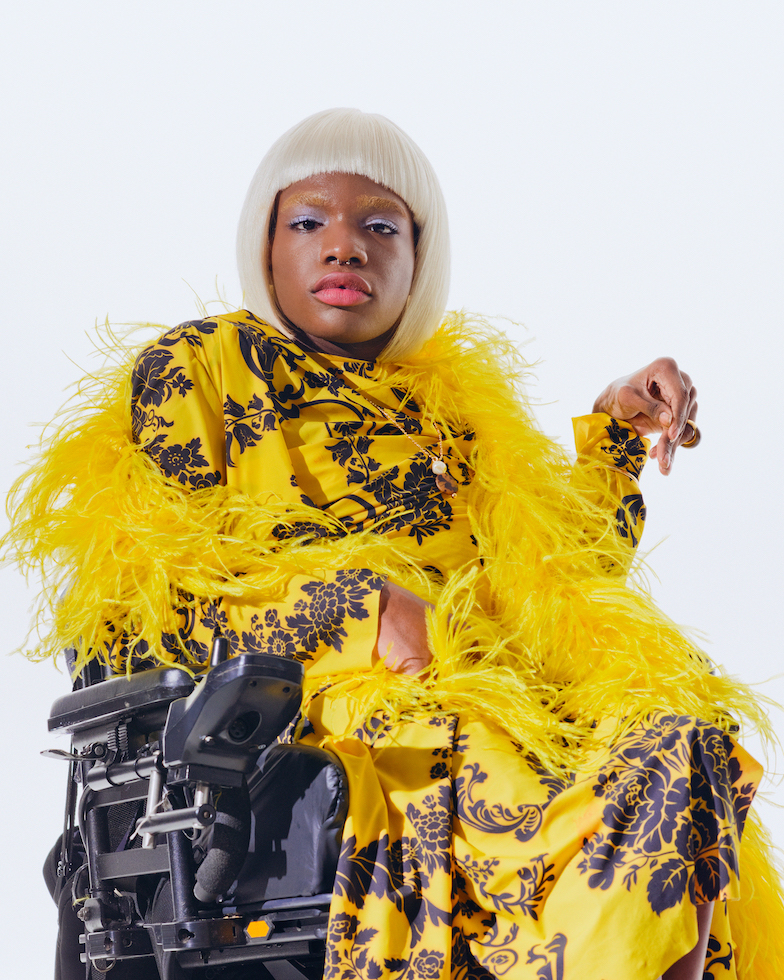
Amandla Stenberg:
Speaking of blackness within the fashion industry, you got to speak to Naomi Campbell… That was so crazy! What was it like being in conversation with her?
Aaron Philip:
Oh my God, so everyone thinks I met her in person – I did not meet her in person. I met her through a phone call and it was a lovely experience. I thought that her questions were so… It always catches me off-guard when people interview me with really well thought out questions because it seems like they genuinely care about me and my journey and what I have to say. It’s like, ‘Wow, you don’t want to tokenise me.’ To have Naomi Campbell, the supermodel and my actual hero, be so kind and so wonderful with these questions, I literally was screaming in my bedroom. It was the most ethereal thing to think it really happened. I was so grateful.
Amandla Stenberg:
Yeah that was such a beautiful conversation to read and witness, to have two trailblazers talking about their experiences in such a challenging industry.
Aaron Philip:
Oh my God a trailblazer! That’s such a nice word.
Amandla Stenberg:
It’s true! [Laughs] So speaking of icons and inspirations… You’ve talked about Sky Ferreira, Blondie, Courtney Love, Foxy Brown as stylistic inspirations – I was wondering why those women in particular?
Aaron Philip:
Wow, this is an amazing question. Thank you so much! I love this question. As I’ve gotten older and stuff, I’ve found inspiration in everyone. I just remember seeing Sky Ferreira for the first time and Rihanna serving looks, and Diana Ross, Grace Jones, Blondie and Chloe Sevigny. They all had something so fresh and they were all themselves, uncompromising. They all had a trademark on their style and personality and their womanhood. It stayed with me. I love that so much about all of those women; they had such a distinct iconic-ness about them. They were interested in what they were interested in, and it shows completely.
Amandla Stenberg:
When did that become important to you? The way women express themselves, particularly through clothing and presentation?
Aaron Philip:
Expressing womanhood through fashion has been a thing of the century. There’s such a way in fashion where you can put things together and be like, ‘Oh this is what a girl or what a woman would wear.’ I think throughout history, that’s been a staple for all women. Now, to see women – especially queer women and women who aren’t traditional – take that narrative and make it their own has been so inspiring to me. When it comes to me and my womanhood especially, I really think that womanhood has no limits and no face to it. I can do whatever I want to do and be a girl or a woman, it does not matter, and I think that people understand that.
Amandla Stenberg:
Say it louder for the people in the back!
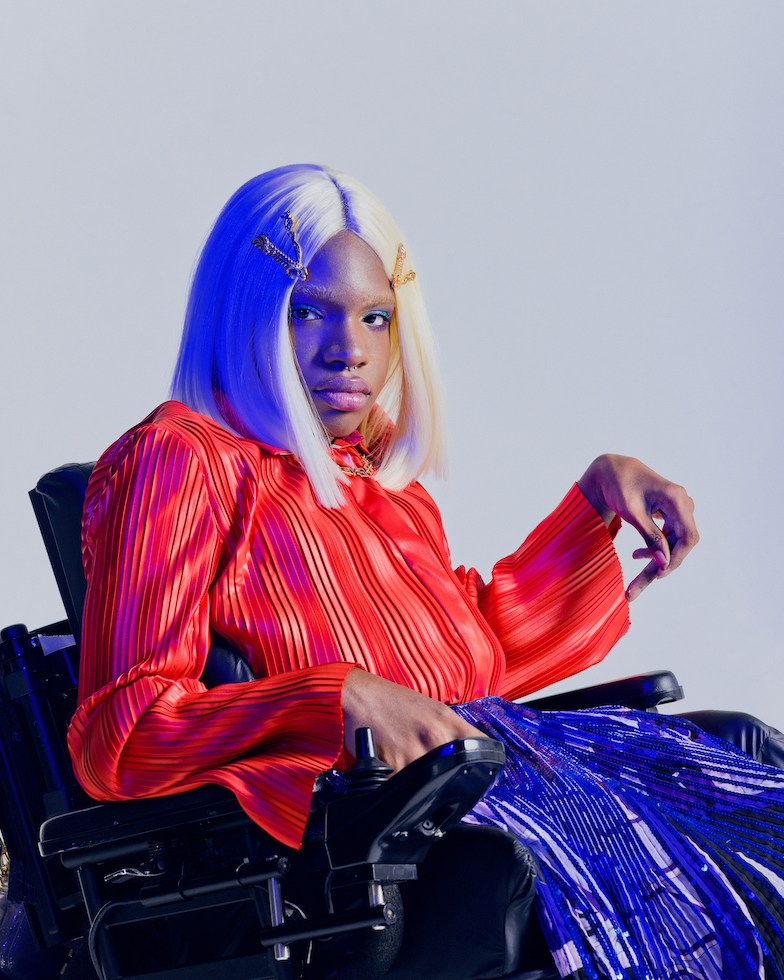
Aaron Philip:
Exactly! Louder for you in the back! I think if all people understood that, the world would be a much better place. If there was no face to gender or identity, that would be so good.
Amandla Stenberg:
For some reason, it’s such a difficult concept for people to be attached, kind of, I don’t know how to say this exactly, the obvious surface level capitalistic, heteronormative ideas around gender. It’s really difficult for them to separate the things they’ve internalised around that.
Aaron Philip:
I feel like at some point, all women start to realise that there’s not one way to exist as a woman or a girl in the world, and it is so liberating. You are what you are no matter what, and it makes you a force to be reckoned with. Do you know what I love? I love seeing women shave their heads and wear suits and masc up! Yes, go off! Reclaim yourself and your time! Do what you want, it’s your world!
Amandla Stenberg:
[Laughs] Yes! What led you to understand that your gender and your presentation is absolutely up to you, and exists exactly how it is without anyone having to validate that through a heteronormative lens?
Aaron Philip:
You know, I find myself talking about this all the time. Before things really popped off with modelling, I looked much different than I do now in October 2019. Before I decided to go full fish, I only wore dreads, sweatshirts and I didn’t care. In terms of presenting more feminine, I didn’t care to do that explicitly like I do now. Honestly, I was chilling in my body and I was feeling my androgynous vibe – and I was living! I was really living for it. It came to a point where I wanted to switch it up a little bit. I wanna have autonomy over my body where if I wanna do something new, I can and not feel about it because it would somehow make me less of what I was before. January 2019 came around and I decided that I wanted to reinvent myself completely; meaning I would get a whole new wardrobe and bleach all my hair including my eyebrows. I wanted to come out looking like I came out of a grunge sewer.
Amandla Stenberg:
A drunk sewer?
Aaron Philip:
Like a grunge sewer, a grungy sewer? I wanted to live my life and look like Blondie.
Amandla Stenberg:
Oh, a grungy sewer! Word.
Aaron Philip:
I wanted to feel my fish, you know?
Amandla Stenberg:
Stinky fish is my favourite type of fish.
Aaron Philip:
Exactly! Stinky fish! We live, right? I felt so confident in my new look because I had this sickening platinum blonde hair and eyebrows and I was feeling my fish. I felt like Prada fish.
Amandla Stenberg:
That’s beautiful. At one point in my life, I changed my hair blonde and I kind of came up against this wall, where I was having these conundrums about whether I was betraying my black womanhood. I was wondering if you had any of those feelings at all?
Aaron Philip:
I actually didn’t. I decided that I shouldn’t feel bad because there’s so many ways to be black. I feel like people don’t think about black punk and the fact that punk was, low-key, made by black people. It was ours, and I feel like blackness is so multi-faceted. Lots of black women experiment with colours and shapes and textures – so why can’t I do it to feel my fish? I know so many black women and femmes feel like their blackness is being misplaced if they do so. I digress. I feel like there’s so many ways to be a black woman at this point. Feel your fish! Live.
Amandla Stenberg:
Absolutely. Thank you. I’m curious about your family, because your parents immigrated to the United States when you were a baby right? How did your Antiguan culture and ancestry integrate into how you think in regards to fashion?
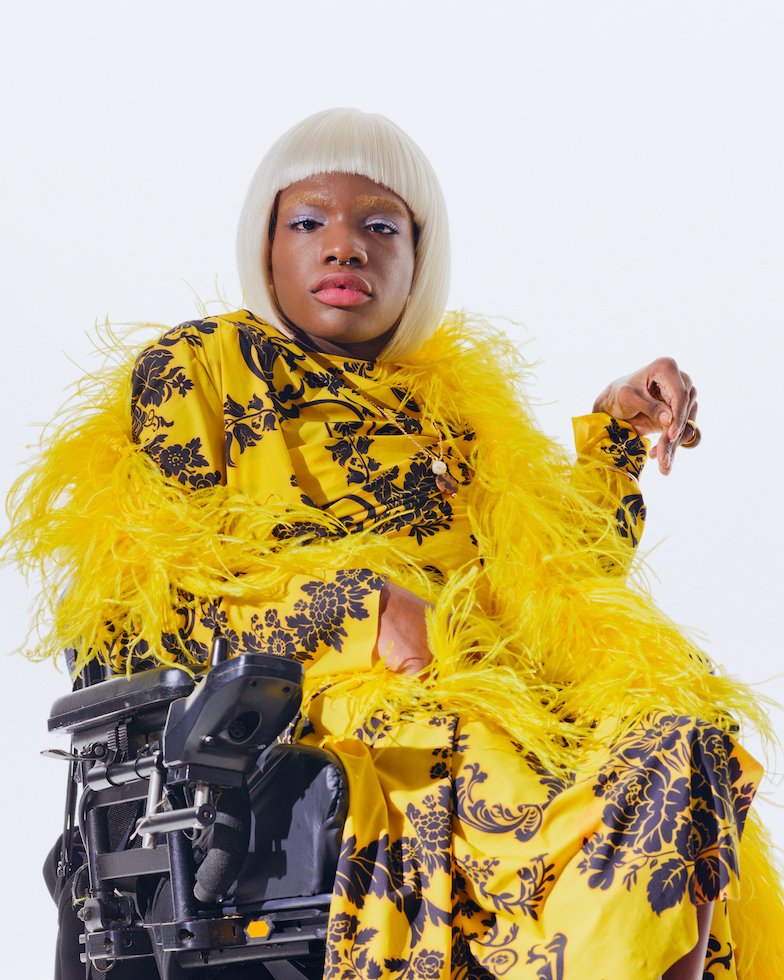
Aaron Philip:
When I think about my cultural identity, I’m Antiguan by blood and I’m American by nature because I was raised here. But ultimately, if I were to claim a place it would be Antigua, period. That’s my home. I was born there. My mom is there, so my heart is in Antigua. I may not have lived there my entire life, but that’s where home is and Antigua is so central to my identity. I think I would be so different if I was born in the United States. I live here in New York, but I live in a very Caribbean household, if that makes sense?
Amandla Stenberg:
Do you ever find that it surfaces through the way you style yourself?
Aaron Philip:
I think that Antigua is so vibrant and wonderful and my mom loves fashion herself, so she loves experimenting with colours, makeup and hair. I remember one time we had the same hair colour by accident, pink hair, so I think I get my sense of style from her. She told me to always take risks, because taking risks creates a real look. She has so much inspiration when it comes to art and being crafty and being generally creative, so I think she passed some of that energy to me.
Amandla Stenberg:
I love that, that’s so cute. So, I feel like the first time I saw your name was on Tumblr…
Aaron Philip:
I was crazy fish back then! Baby fish!
Amandla Stenberg:
[Laughs] I remember thinking it was so major because you wrote a book, which was being circulated a lot on the internet. I was wondering how you became an author?
Aaron Philip:
That’s a whole kiki! My book is so interesting because it’s about me when I was much younger and how it was to be a kid with a disability in New York City. When I was 14, before the book came out, I was not out as a trans person yet at all. It’s hard but I love my book, period, and it still documents my life as a young person. I was not the bravest person at all when I was young, I had my fair share of things to deal with, and I think people were just not aware of the fact that there are people like me out there. What I wanted at the time was for another kid like me to read it and be happy.
Amandla Stenberg:
Did you have any experiences of people reading your work and being touched by it?
Aaron Philip:
All the time. People will tell me they’ve read it and said, ‘Although it’s not an accurate reflection of you now, it still shows so much about who you were and who you are because your past is still a part of you.’ I agree, and I’m so happy about that.
Amandla Stenberg:
How does it feel for you to be representative of black models, disabled models and trans models? Is it something you enjoy or does it come with its own set of qualms?
Aaron Philip:
With my identity, I love the fact that people who are just like me can relate to me and feel represented. That’s what I want, I want people to look at me and feel like they have someone who is advocating for them. I like that part of it. But what I don’t like most is the background line of how I’m described online, as ‘the trans disabled model’. Not Aaron Philips, the model.
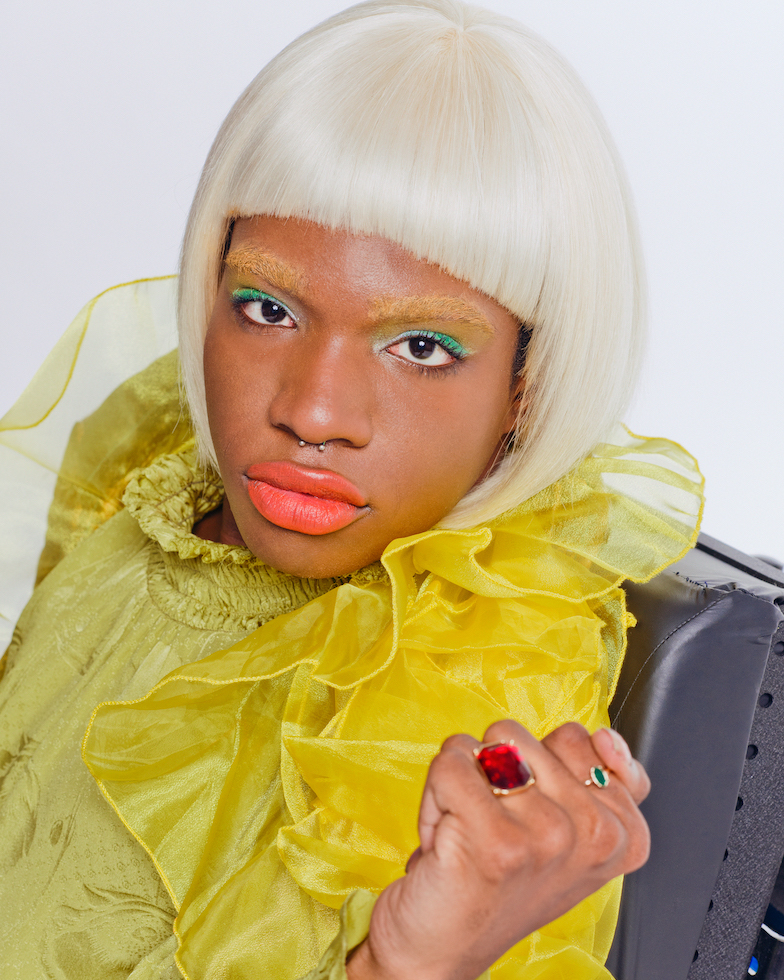
Amandla Stenberg:
Aaron Philip, the person.
Aaron Philip:
The person! I’m me. Being trans and disabled… I don’t want to claim it because I have to claim it. I claim it because it is me, objectively. It’s a whole other thing when people look at you and reduce you to that completely. The way I think of myself – and the way my friends think of me – is as Aaron, the black girl who happens to be disabled and works as a model. They don’t think of me as Aaron Philip, the trans and disabled model. I’m not a transgender model, period. I’m not a disabled model, period. I’m a model, and I’m here to do the job that anyone else is doing as a model. In my general life, it affects me so much because people see me and think, ‘Oh my God, that’s the disabled model! That’s the trans model! Yas! Wow!’
Amanda Stenberg:
That’s the unfortunate caveat of advocating for representation, the fetishisation of components of identity. It’s almost like you are not being conceptualised as a three-dimensional person, but rather just by these components of your being that have been radicalised. How do you deal with that within the fashion industry?
Aaron Philip:
It’s hard. I know that my womanhood intersects with being trans and black. As a black woman, you have to work ten times harder than a white or non-black woman in some cases. Then as a trans woman who is black, that makes life infinitely harder because for some reason, this world does not like trans women very much. Professionally, I have worked really hard advocating on being seen as a woman, first and foremost, as a model. There should be models with disabilities and there should be black trans women as models. Why should that make me an entirely different entity of model, when I’m just Aaron Philip? I’m chilling, I’m 18 and I’m a girl and I’m a teenager – why should that make me any different?
Amandla Stenberg:
I feel like we got to cover a lot of important things in this interview.
Aaron Philip:
Amandla I love you so much! Thank you so much for interviewing me.
Amandla Stenberg:
Of course baby! I love you too, I’m so happy we did this.
Aaron Philip:
It’s so meaningful to me to have you a part of this, I don’t think you know how much of an impact you have had on me personally. You are so meaningful and I hope you know that.
Amandla Stenberg:
That’s so sweet. You fully give me life every single day and it’s been so marvelous to see your beautiful unfolding over the past few years. Sending love from Paris!
Aaron Philip:
Thank you, I love you.



